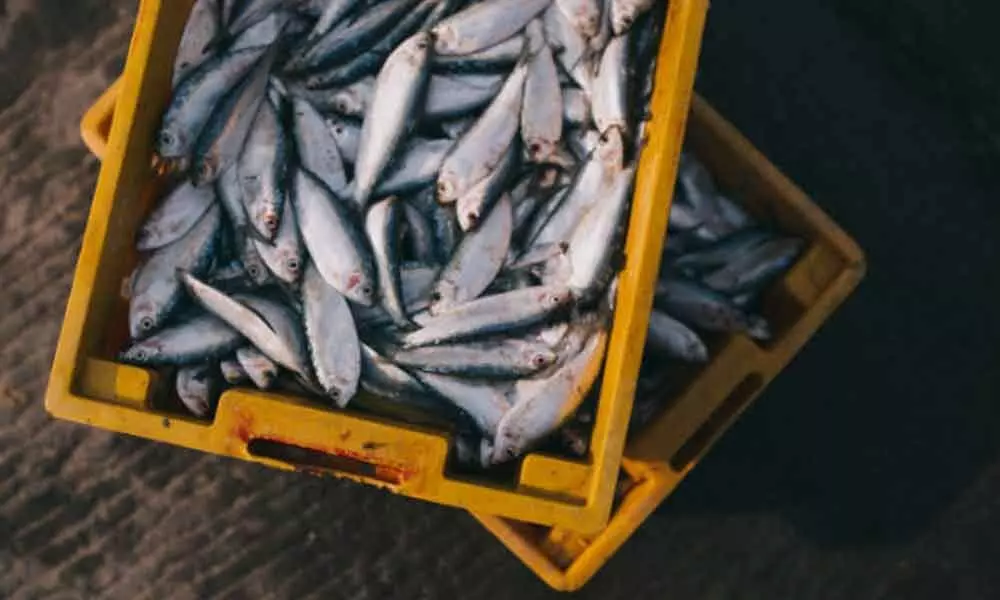Live
- First Impressions and Unboxing of the MacBook Pro M4: A Powerhouse for Professionals and Creators
- China Gears Up for Potential Trade War Amid Trump’s Tariff Threats
- Small Farmers Gain Less by Selling to Supermarkets: Study Reveals
- Why Despite the Controversy, America Is Anticipating the Mike Tyson vs. Jake Paul Fight
- Sanju Samson and Tilak Varma Shine: Record-Breaking Feats in 4th T20I Against South Africa
- India Urges $1.3 Trillion Annual Climate Support for Developing Nations
- Bad air: 106 shuttle buses, 60 extra Metro trips planned to make Delhiites give up cars
- WHO reports declining monkeypox cases in Congo
- CM Attends Kotideepotsavam on Kartika Purnima
- PKL Season 11: Raiding trio of Devank, Ayan, Sandeep help Patna Pirates rout Bengal Warriorz
Just In
When these 3-some saw AP shrimp ryots in Audis, BMWs


Bachelor of Fisheries Science
Three young students of Bachelor of Fisheries Science (BFSc) at the Mangalore Fisheries College saw some shrimp farmers in Andhra Pradesh owing Audis and BMWs during their internship.
Bengaluru: Three young students of Bachelor of Fisheries Science (BFSc) at the Mangalore Fisheries College saw some shrimp farmers in Andhra Pradesh owing Audis and BMWs during their internship.
This made A.H. Kaushik, V.S. Karthik Gowda, and S.V. Sachin then resolve to turn into entrepreneurs.
Passing out in 2019 and after a decent initial business success, the three 23-year-old fisheries graduates decided to travel in largely uncharted waters - seed production of Asian sea bass. "Shrimp farming is a mature industry in India. We decided on sea bass when the industry itself is in a nascent stage," Kaushik, Managing Partner, of their start-up Canares Aquaculture LLP, told IANS.
On Sunday, the ICAR-Central Institute of Brackishwater Aquaculture (CIBA) announced the signing of an MoU with the start-up at Karnataka's Kumta for transfer of sea bass seed production technology.
"This is the first attempt in the country in setting up a sea bass hatchery in the private sector on a start-up mode," ICAR-CIBA Director K.K. Vijayan told IANS.
"This assumes significance as Prime Minister Narendra Modi on Thursday launched Pradhan Mantri Matsya Sampada Yojana (PMMSY) to boost fish production, sustainable growth of the fisheries sector and doubling farmers' income," he added.
He said the sea bass is a most sought-after fish, but producing young ones is difficult.
"Unlike many others, the boys did not wait for any government subsidy and decided to jump in immediately. We gave them 45-day old sea bass larvae which they grew for some days and sold for a good profit," Vijayan said.
According to him, the ICAR-CIBA charged Rs 5 lakh for the transfer of technology and 10 percent royalty on the net profit of the company.
Kaushik said: "Soon after passing out, we started a small sea bass nursery - KKS Aquaculture at Kundapura near Mangaluru - and got about 35,000 sea bass larvae and sold about 27,000 after rearing them for some time."
It was then the three youths got in touch with industrialist H.S. Gajanan who had earlier bought a defunct shrimp hatchery's land and building.
"We had discussions with him. He and his wife became our angel investors. The shrimp hatchery building which he had bought earlier is now the sea bass hatchery," Kaushik said. With 80 tanks, he said their yearly capacity will be three million sea bass fries and two million fingerlings.
Canares Aquaculture will get the sea bass eggs or fries and brooder from the ICAR-CIBA, rear it in its tanks for about two-and-half months and then sell it to the farmers, said Kaushik.
"By that time, the weight of each small fish will be 10-12 grams and size will be 3-4 inches. A 10-gram fish will fetch Rs 40-45," Kaushik said. According to him, the ICAR-CIBA will also provide the necessary know-how, and technology in sea bass breeding.
Vijayan said there is good demand for its quality seeds among aqua-farmers across the country.
The presence of a well-established value chain for sea bass is very evident from spawn to harvest size, where huge demand exists among the farmers for the range of hatchery and farm-produced seeds.
In the sea bass value chain, on tier wise rearing mode for fry, fingerlings, advanced fingerlings and sub-adults, a net profit of Rs 1-1.50, Rs 10-15, Rs 30-50 and Rs 140-190, can be made, respectively, Vijayan said. A grown-up sea bass above one kg size fetches a market price in the range of Rs 450-750, again with smart profits for the sea bass farmer.
Emphasizing the need for boosting the production of quality seeds of Asian sea bass, Vijayan said that it is equally important to use indigenous technologies in both hatchery-reared seeds and formulated feeds for the development of scientific sea bass farming in the country.

© 2024 Hyderabad Media House Limited/The Hans India. All rights reserved. Powered by hocalwire.com






